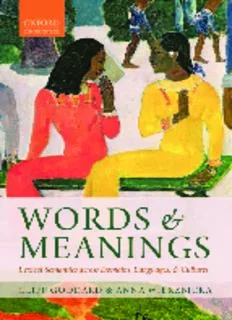
Words and Meanings: Lexical Semantics Across Domains, Languages, and Cultures PDF
Preview Words and Meanings: Lexical Semantics Across Domains, Languages, and Cultures
OUPCORRECTEDPROOF–FINAL,4/11/2013,SPi Words and Meanings OUPCORRECTEDPROOF–FINAL,4/11/2013,SPi OUPCORRECTEDPROOF–FINAL,7/11/2013,SPi Words and Meanings Lexical Semantics across Domains, Languages, and Cultures CLIFF GODDARD AND ANNA WIERZBICKA 1 OUPCORRECTEDPROOF–FINAL,4/11/2013,SPi 3 GreatClarendonStreet,Oxford,ox26dp, UnitedKingdom OxfordUniversityPressisadepartmentoftheUniversityofOxford. ItfurtherstheUniversity’sobjectiveofexcellenceinresearch,scholarship, andeducationbypublishingworldwide.Oxfordisaregisteredtrademarkof OxfordUniversityPressintheUKandincertainothercountries ©CliffGoddardandAnnaWierzbicka2014 Themoralrightsoftheauthorshavebeenasserted FirstEditionpublishedin2014 Impression:1 Allrightsreserved.Nopartofthispublicationmaybereproduced,storedin aretrievalsystem,ortransmitted,inanyformorbyanymeans,withoutthe priorpermissioninwritingofOxfordUniversityPress,orasexpresslypermitted bylaw,bylicenceorundertermsagreedwiththeappropriatereprographics rightsorganization.Enquiriesconcerningreproductionoutsidethescopeofthe aboveshouldbesenttotheRightsDepartment,OxfordUniversityPress,atthe addressabove Youmustnotcirculatethisworkinanyotherform andyoumustimposethissameconditiononanyacquirer PublishedintheUnitedStatesofAmericabyOxfordUniversityPress 198MadisonAvenue,NewYork,NY10016,UnitedStatesofAmerica BritishLibraryCataloguinginPublicationData Dataavailable LibraryofCongressControlNumber:2013945603 ISBN 978–0–19–966843–4 Asprintedandboundby CPIGroup(UK)Ltd,Croydon,CR04YY LinkstothirdpartywebsitesareprovidedbyOxfordingoodfaithand forinformationonly.Oxforddisclaimsanyresponsibilityforthematerials containedinanythirdpartywebsitereferencedinthiswork. OUPCORRECTEDPROOF–FINAL,4/11/2013,SPi Contents Authorshipnote vi Acknowledgements vii Tablesandfigures viii 1 Words,meaning,andmethodology 1 2 Men,women,andchildren:thesemanticsofbasicsocialcategories 22 3 Sweet,hot,hard,heavy,rough,sharp:physical-qualitywordsin cross-linguisticperspective 55 4 From“colourwords”tovisualsemantics:English,Russian,Warlpiri 80 5 Happinessandhumanvaluesincross-culturalandhistoricalperspective 102 6 Pain:isitahumanuniversal?Theperspectivefrom cross-linguisticsemantics 127 7 Suggesting,apologizing,complimenting:Englishspeech-actverbs 156 8 Astitchintimeandthewayofthericeplant:thesemanticsof proverbsinEnglishandMalay 184 9 Themeaningof“abstractnouns”:Locke,Bentham,and contemporarysemantics 205 10 Broaderhorizons:beyondlexicalsemantics 238 References 262 Index 291 OUPCORRECTEDPROOF–FINAL,4/11/2013,SPi Authorship note Thisbookpresentsresultsofourcollaborativeworkinlexicalsemanticsoverthepast fiveorsixyears.Forconsistency,wehaveemployedajointauthorialvoicethrough- out. It may be useful to state, however, that Chapters 4, 5, and 6 were principally authoredbyAnnaWierzbicka,andChapters7and8byCliffGoddard,ineachcase withsubstantialinputfromtheother.Chapters1,2,3,9,and10werejointlyauthored. OUPCORRECTEDPROOF–FINAL,4/11/2013,SPi Acknowledgements ThisbookowesagreatdealtoourongoinginteractionswithcolleaguesintheNSM research community, both in Australia and overseas. In particular, we have been sustained (as well as challenged) by NSM workshops held twice yearly at the Australian National University. We are also greatly indebted to several cohorts of studentswhohaveparticipatedinsemanticseminarsattheANUandattheUniver- sity of New England. They have kept us on our toes, contributed insights, and enhanced the joys of our search for semantic understanding. Warm thanks to themall. We would like to thank Carol Priestley for her careful and insightful help in preparingthefinalmanuscript.WearegratefultoHelenBromhead,AnnaGladkova, CarstenLevisen,andZhengdaoYeforhelpfulcommentsonvariouschapters.Other acknowledgements are given below. Part of the research reported in this book was supportedbytheAustralianResearchCouncil. Chapter3isarevisedversionofanarticlebyCliffGoddardandAnnaWierzbicka (2007), titled ‘NSM analyses of the semantics of physical qualities: sweet, hot, hard, heavy, rough, sharp in cross-linguistic perspective’, Studies in Language 31(4), 765–800. Chapter4 is an expanded and revised version of an article by Anna Wierzbicka (2008),titled‘Whythereareno“colouruniversals”inlanguageandthought’,Journal oftheRoyalAnthropologicalInstitute14(2),407–425. Chapter5buildsonAnnaWierzbicka’searlierpublicationson‘happiness’includ- ing: ‘“Happiness” in a cross-linguistic and cross-cultural perspective’, Daedalus (2004)133(2),34–43;‘What’swrongwith“happinessstudies”:theculturalsemantics of happiness, bonheur, Glück and sčast’e’, in Leonid Iomdin etal. (eds), Word and Language[inRussianSlovoiJazyk],Moscow:JazykiRusskoyKultury,2011,155–171; and‘The“historyofemotions”andthefutureofemotionresearch’,EmotionReview (2010)2(3),269–273. Chapter6 is an expanded and revised version of an article by Anna Wierzbicka (2012), titled ‘Is pain a human universal? A cross-linguistic and cross-cultural perspectiveonpain’,EmotionReview4(3),307–317. OUPCORRECTEDPROOF–FINAL,4/11/2013,SPi fi Tables and gures Tables 1.1 Semanticprimes(Englishexponents),groupedinto relatedcategories 12 1.2 Valencyframearraysforthreesemanticprimeshappen,do, andthink 14 2.1 Google“hits”forfourEnglishcollocations(rounded) 41 7.1 Sevensyntacticframesforsemanticprimesay 159 Figures 2.1 Standardfeatureanalysisofman,woman,boy,girl 23 8.1 Structureofsemantictemplateforproverbmeanings 190 OUPCORRECTEDPROOF–FINAL,4/11/2013,SPi 1 Words, meaning, and methodology 1.1 Why words matter Mainstream linguistics in the 20th century devoted startlingly little attention to words. Yet words matter a great deal. They matter in human relations (which are often shaped by names, titles, terms of address and kin terms), in the edifice of humanknowledge(tomentiononlynumberwords,thenamesofbiologicalspecies, andtheroleofterminologyinscience),andinsystemsofreligion,belief,andvalues. “The human spirit thinks with words,” wrote the 18th-century German thinker Johann Gottfried Herder, and although Herder’s words have often been disputed, they reflect a deep-seated human intuition that words matter. In Isaiah Berlin’s elegantparaphraseofHerder’sGerman: Words,byconnectingpassionswiththings,thepresentwiththepast,andbymakingpossible memoryandimagination,createfamily,society,literature,history.[...]tospeakandthinkin wordsisto‘swiminaninheritedstreamofimagesandwords;wemustacceptthesemediaon trust:wecannotcreatethem’. (Berlin1976:168) BeforeHerder therewasVico,anothergreatvisionary andbelieverinthefunda- mental importance of words, of whom Berlin, in his book Vico and Herder, wrote: “hewas,sofarasIknow,thefirsttograsptheseminalandrevolutionarytruththat linguisticformsareoneofthekeystothemindsofthosewhousewords,andindeed to the entire mental, social and cultural life of societies” (Berlin 1976: 51). For Vico, these“linguisticforms”whichcanprovidethekeystothemental,socialandcultural lifeofsocieties,presentandpast,are,aboveall,words. Hissensitivenesstowordsandthephilosophicalsignificanceoftheirusecanbeverymodern. So, for example, he notes what has only in our day been analysed and classified as the ‘performative functions of words’, namely the fact that words themselves need not merely describeorattractattentiontosomethingoutsidethemselves,butmaythemselvesbeactsor intrinsic elements in action, as, for example, in the part that they play in legal transfers, or religiousceremonial.Thatwordsarenotinvariablyusedtodescribe,orcommand,orthreaten orejaculateorconveyimagesoremotions,butcanthemselvesbeaformofaction,iscertainlya newandimportantidea. (Berlin1976:50)
Description: